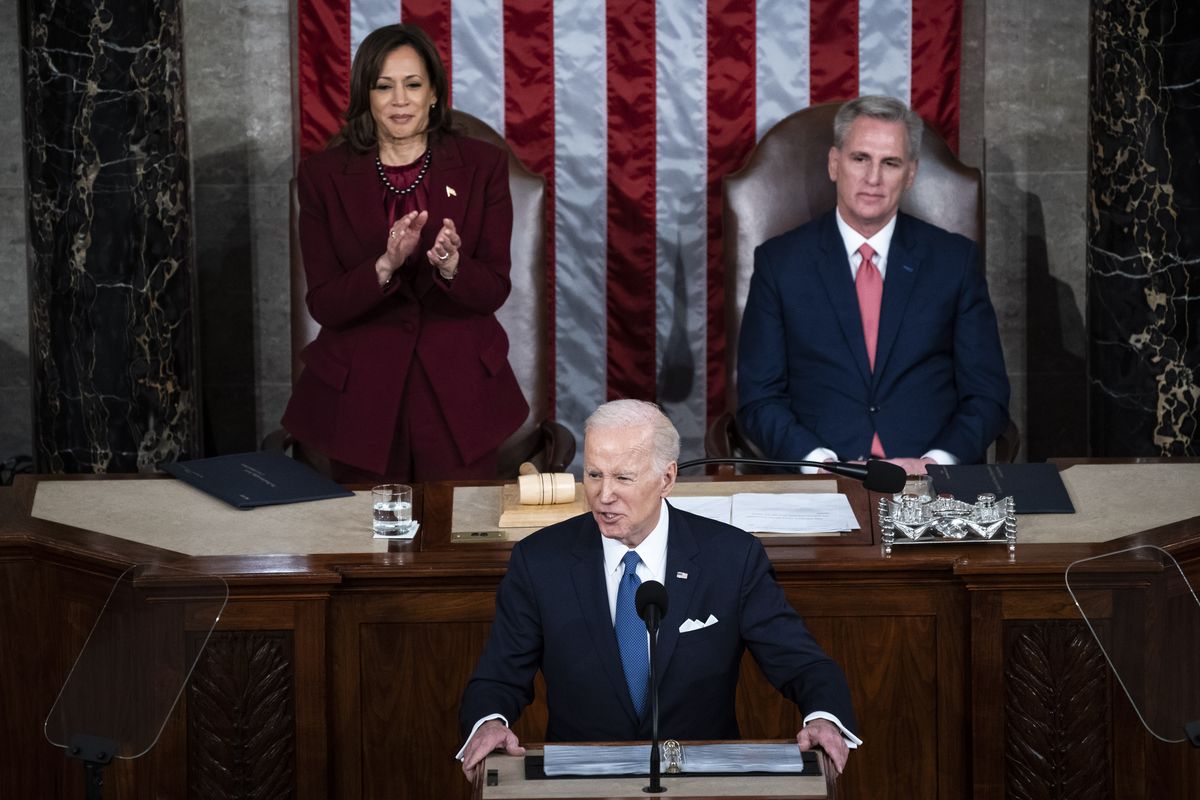GOP hopefuls’ past positions on Social Security loom over 2024 primary
Former president Donald Trump speaks to a crowd during a campaign event at the South Carolina Statehouse in Columbia, S.C., on Jan. 28. (Sean Rayford/for The Washington Post)
Donald Trump is going on the attack against potential rivals for the 2024 Republican presidential nomination over Social Security and Medicare, seizing on the same GOP divisions over federal spending that President Biden is seeking to exploit.
Trump moved to wield the issue as a wedge in the primary, particularly against Florida Gov. Ron DeSantis, with a video message last month urging Republicans to use negotiations over raising the debt ceiling to cut spending but not “a single penny” from Social Security or Medicare. He also posted a short video clip of a younger DeSantis praising Paul D. Ryan, the former House budget chairman from Wisconsin who famously proposed replacing Medicare with giving seniors money for private health insurance.
The emphasis reflects potential vulnerability for Republican rivals who were elected to powerful posts in the pre-Trump tea party era, embracing austerity in the last showdown over raising the federal debt limit. As Trump’s campaign has signaled an interest in stoking debate over entitlements, Biden used his State of the Union address on Tuesday to similarly bait Republicans, producing a rowdy spectacle in which they booed his accusation that they want to cut Social Security and Medicare.
“President Trump has been clear where he stands on the issue,” Trump campaign spokesman Steven Cheung said in a statement. “Others will have to decide which side they’re on. And others will have to answer to past positions they’ve taken.”
Protecting Social Security, in contrast with other Republicans who were more hawkish on deficits and spending, was also a major theme of Trump’s 2016 campaign. His avowed stance, however, is at odds with Trump’s own record as president: Each of his White House budget proposals included cuts to Social Security and Medicare programs.
Several other prominent Republicans making moves toward running for president have a history of embracing cuts.
“I support what Ryan is trying to do in terms of reforming entitlements,” DeSantis said in a 2012 newspaper questionnaire. “It’s not a voucher, it’s premium support.”
As a member of Congress, DeSantis voted for three nonbinding budget resolutions calling for raising the retirement age and slowing future spending growth for Social Security. He received a 0 percent rating from the Alliance for Retired Americans, an affiliate of the AFL-CIO. During a previous showdown over the debt limit in 2013, DeSantis said he supported including Social Security and Medicare in the negotiations.
“I think we need to restructure some of these entitlements,” he said in a 2013 CNN interview. “I think we should try to look at entitlements, look at restructuring Medicare so it’s delivering services at a lower cost to the taxpayer.” Spokespeople for DeSantis did not respond to a request for comment.
Nikki Haley, the former South Carolina governor and United Nations ambassador who is planning to announce her own presidential bid this month, also praised Ryan’s Medicare proposal at the time and said lawmakers should examine Medicare and Social Security spending to address federal debt.
“What they need to be doing is looking at entitlements,” Haley said in a 2010 interview on Fox News. “Look at Social Security. Look at Medicaid. Look at Medicare. Look at these things, and let’s actually go to the heart of what is causing government to grow, and tackle that.”
Fiscal conservatives have fought Social Security and Medicare since their inception as crowning achievements of Democratic presidents, and rising national debt has intensified calls for overhauling the programs in recent decades. But charting a new course for entitlements has also long proved a graveyard for Republican ambitions.
In 2004, President George W. Bush seized on his reelection victory by making his top domestic priority diverting Social Security savings into private accounts, declaring, “I earned capital in this campaign, political capital, and now I intend to spend it.” The initiative smashed into congressional resistance and contributed to tanking Bush’s public approval.
Bush’s proposal resurfaced this month in a speech by Mike Pence, Trump’s former vice president who is now taking steps toward his own White House run. In the Feb. 2 speech to the National Association of Wholesaler-Distributors, Pence called it “an idea whose time has come.”
“I think the day could come when we could replace the New Deal with a better deal and literally give younger Americans the ability to take a portion of their Social Security withholdings and put that into a private savings account that the government would oversee,” Pence said in the speech, first reported by Yahoo News.
Pence’s campaign-in-waiting has signaled staking out a sharp contrast with Trump on this issue. Top Pence adviser Marc Short elaborated in a recent op-ed in the National Review, arguing that Republicans demanding spending cuts without touching Social Security or Medicare were being disingenuous or unrealistic.
“I understand that some Republicans are reluctant to address entitlement reform because Democrats’ demagoguery on the issue in the next election cycle would hurt them,” Short said, “but that does not justify misleading the American people by claiming that we can solve the fiscal crisis by taking a scalpel to ‘wokeism’ or the military-industrial complex.”
Social Security spending makes up the largest single chunk of the federal budget, at 19 percent, and health-care programs including Medicare account for another 15 percent, according to Treasury Department data. As life expectancy has increased, birth rates declined, and more people enter retirement than enter the workforce, two federal trust funds that feed Social Security benefits are on track to take in less revenue than they’ll need to cover costs. The trustees project the funds to become insolvent in 2035, at which point the government would have to cut benefits, raise taxes or some of both, according to the Congressional Research Service.
Asked about their confidence in relying on future Social Security benefits, Americans were evenly split in AP VoteCast’s surveys of 2022 midterm voters, with Republicans reporting slightly less confidence than Democrats. More than half the country has said the U.S. spends “too little” on Social Security in the NORC General Social Survey since 1998. The portion of Americans who say the U.S. spends “too much” on Social Security ranged from 4 to 10 percent in the polls, landing at 6 percent in 2021.
Democrats spent more than $97 million on ads about Social Security in the 2022 midterms, according to data from the media tracking firm AdImpact. The main Democratic Senate super PAC pummeled Arizona Republican Blake Masters with ads showing him suggesting, “Maybe we should privatize Social Security,” while a spot against New Hampshire candidate Don Bolduc played a clip of the Republican saying, “Over time, we no longer have Social Security.”
Social Security and Medicare ranked among the most discussed issues in Democratic midterm ads, trailing abortion alongside health care, character-based attacks and special interests. Republican ads scarcely mentioned them.
Other potential entrants in the Republican primary, such as former secretary of state Mike Pompeo, Sen. Tim Scott (S.C.) and South Dakota Gov. Kristi L. Noem, also voted for Ryan’s budget when they were in Congress.
“There’s no doubt that we have to wrestle this beast to the ground and do the right thing,” Scott said on Fox News in 2012. “The fact is that if we don’t start having a real conversation about people in their 40s and younger about the transformation of the system, it won’t be available for folks now in their 20s and 30s.”

